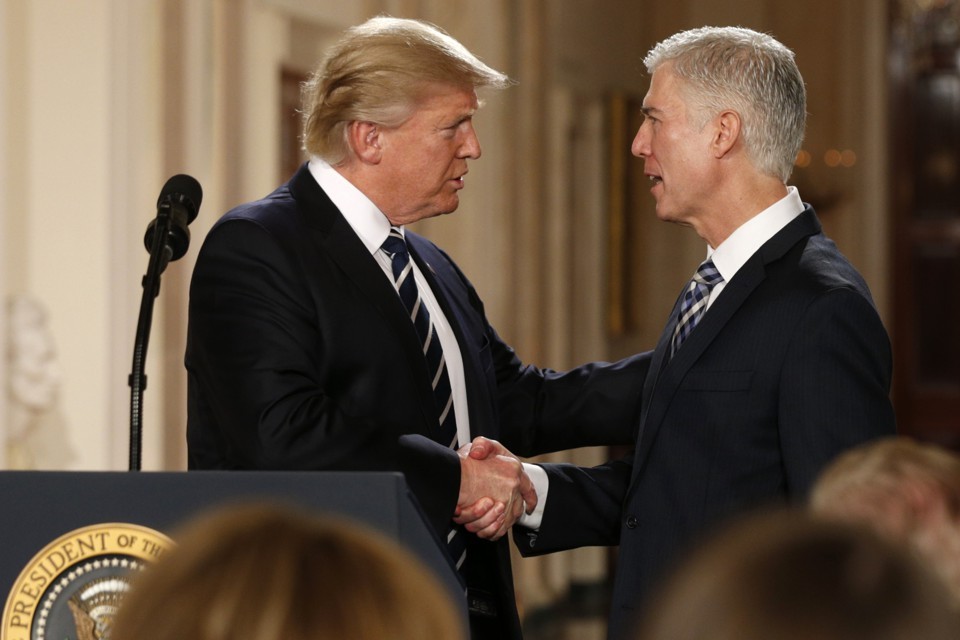Posted on February 1, 2017

Today Trump nominated Neil Gorsuch for the open position on the United States Supreme Court. There hasn’t been too much of an outcry (yet) as it was generally expected. After all, Trump put out his list of possible Justice selections before he was even elected (SOURCE). However, in an attempt to mitigate some of the inevitable onslaught that will come when Gorsuch is being confirmed in the senate – let’s go over what the current state of the court is, who this guy is, and what it means for the status of laws in the US today that you may be concerned about.
It’s important to have a general background of how the constitution designed the court.
- The Supreme Court is made up of 9 total justices that each serve for life. (Or until they choose to retire)
- It is the President’s enumerated right to nominate whomever he thinks will be the best steward of the constitution. It’s to be expected a conservative/liberal president will nominate a relatively conservative/liberal Justice.
- The senate then votes on his or her approval ( the Senate (typically) needs 60 /100 votes to confirm a nominee)
- When the Justices are deciding a case – majority votes win. (Referred to as majority opinion)
The Supreme Court under Obama included Justices Ginsberg, Breyer, Kagan, Sotomayor, Roberts, Kennedy, Thomas, Scalia, Alito. Recently, in February 2016, Justice Antonin Scalia (a renowned and legendary conservative justice) died leaving a vacancy on the court. Obama nominated Merek Garland to replace him, but the republicans would not hear a vote to confirm Garland to the court (wanting to wait for a conservative president). However you feel about that politically is outside the discussion. Obama had already successfully placed two Justices on the court (Sotomayor and Kagan). The court has had several split decisions (4-4) in the absence of Justice Scalia.
Fast forward again to today — and we have judge Neil Gorsuch nominated by President Trump for the open slot left by conservative Justice Scalia. The senate will move to confirmation hearings soon. The Democrats have already signaled that they will try to block his nomination. *The interesting thing to note — if the senate does not reach the 60 vote threshold needed to confirm Gorsuch to the court — the Republicans can invoke what is now referred to as the “nuclear option” to close debate and force a majority vote. Democrats employed this option in 2013 to confirm President Obama’s nominees to the court and cabinet. Since the Republicans enjoy a current majority in the senate, this virtually ensures Gorsuch’s confirmation. Please read more about the nuclear option HERE.
So who is he? Gorsuch is a 49 year old judge on the United States Court of Appeals for the Tenth Circuit. Basically he’s a judge right below the status of Supreme Court Justice. It is important to note that there are many judges in similar rolls, as there are 13 appellate courts that sit below the SCOTUS and each court has many judges.

Neil Gorsuch
Gorsuch has a stellar resumé as he went to Columbia University, Harvard Law, and earned a Doctorate in Legal Philosophy from Oxford University. Needless to say, he has plenty of experience on the court and was nominated by President George W. Bush to the 10th circuit in 2006. As for his legal views, he is generally seen as a strong conservative and approaching an “originalist” doctrine of jurisprudence (see HERE for an explanation of this term). Also read a bit more detail about his legal opinions HERE.
How is this going to affect the court going forward? The common sense and calm explanation is that he is replacing one of the most notable originalists in the history of the Supreme Court — so in the context of tipping the balance of the court – it won’t change much of anything. At least not right now. Both Justice Ginsberg and Justice Kennedy are getting very old at ages 85 and 80 respectively. If either one were to retire in the next 4 years, Trump has another nomination to make. Only then are we in for possible legal changes in the way the court tends to votes.
Here it is important to note that the decision on gay marriage (Obergefell vs. Hodges) was decided on a slim 5-4 margin WITH Scalia on the court (SOURCE). Gorsuch would likely not change this vote if presented with a similar case. Also the decision to uphold the Affordable Care Act (Obamacare) mandate and state’s medicaid expansion was also decided on a slim 5-4 decision (SOURCE).
Lastly, please understand that the SCOTUS does not like to overturn its previous rulings and this is by design. By the time the Supreme Court hears a case it has already gone through significant rulings on both the state and the Federal Appellate Court levels — and once past there — the SCOTUS can choose whether or not to hear the case on the current docket. This doesn’t mean that is hasn’t happened – and it has – on numerous occasions. Many landmark cases you may have heard of have been reversals. If you’d like to read more about SCOTUS reversals click HERE.
I write all of this to achieve a few goals.
- To prepare you with information for what discussion are soon coming about Gorsuch
- To give you context of “threat level” this nomination poses to your views.
- To remind you of the importance of the legal system
- To give political context for what this means for America moving forward
- To cut through all of the noise you are about to hear
So what’s the take home message? You should be neither surprised nor upset about the nomination of Gorsuch no matter what side of the fence you are on. When Trump won the election it was obvious that he would select a conservative Justice to the court. This will not change the previous balance of the court under Obama. That means that when someone tells you that gay rights are threatened or anything like that – it just isn’t true. If Trump get’s a chance to nominate another Justice – it will most likely be after the next midterm election – in which case people will have a chance to vote in or out senators that will affect that confirmation process. It will be a process that you have some control over — if you like the idea of a conservative on the court (which I do) then vote in more Republicans — vice versa if you don’t agree.
My main goal is always to inform — but I do hope I can give you a calm place to come with no advertisements where you can really absorb some information, see my views on things, and hopefully discuss things. Stay informed, lean on the facts, and you’ll be just fine in this absolute hurricane of a political environment. Get ready for more.


Recent Comments